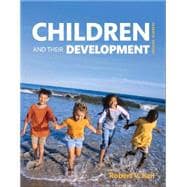Demonstrates how research translates into practice.
Reflecting the way scientists conduct research on children’s development, Children and Their Development is organized topically, showing readers the way researchers actually study the discipline. The book’s unique and effective pedagogy focuses on practice through its accessible writing, modular format, and application-based features. It explores the theory, research, and application of modern child development from conception through adolescence. Author Robert V. Kail is a well-known and respected research in the field of child development.
Children and Their Development can be sold as a standalone, or packaged with Pearson’s latest technologies: MyPsychLab.
MyPsychLab is an integral part of the Kail program. Engaging activities and assessment provide a teaching and learning system that help students become scientific thinkers. With MyPsychLab, students can watch videos on psychological research and participate in virtual classic experiments.
Teaching and Learning Experience
This program will provide a better teaching and learning experience- for you and your students. It:
- Personalized Learning with MyPsychLab: MyPsychLab delivers proven results in helping students succeed, provides engaging experiences that personalize learning, and comes from a trusted partner with educational expertise and a deep commitment to helping students and instructors achieve their goals.
- Engaging Pedagogically-Driven Design: An effective pedagogy promotes students’ learning. For examples, Learning Objectives in each chapter correspond to chapter summary materials.
- Explore Research and Theory: Fundamental developmental issues are used as a foundation for students’ learning of research and theory in child development. Student learn how developmental science draws on many complementary research methods, each of which contributes uniquely to scientific progress.
- Understand Culture and Development: Students are shown how the findings from child-development research can improve children’s lives.
- Support Instructors: Video embedded PowerPoints, MyTest, clicker questions, and an instructor’s manual provide instructors with extensive materials to supplement the text.
Note: this is the standalone book, if you want the book/access card order the ISBN below:
0134081501 / 9780134081502 Children and Their Development Plus NEW MyPsychLab with Pearson eText -- Access Card Package
Package consists of:
0133595684 / 9780133595680 Children and Their Development
0205206514 / 9780205206513 NEW MyPsychLab with Pearson eText -- Valuepack Access Card








